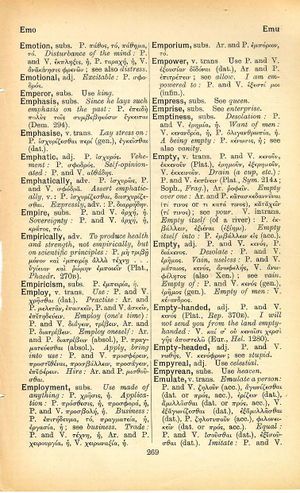emphasis: Difference between revisions
καὶ οἱ ἀμαθέστατοι τῶν ἰατρῶν τὸ αὐτὸ σοὶ ποιοῦσιν, ἐλεφαντίνους νάρθηκας καὶ σικύας ἀργυρᾶς ποιούμενοι καὶ σμίλας χρυσοκολλήτους: ὁπόταν δὲ καὶ χρήσασθαι τούτοις δέῃ, οἱ μὲν οὐδὲ ὅπως χρὴ μεταχειρίσασθαι αὐτὰ ἴσασιν → the most ignorant of doctors do the same as you, getting themselves ivory containers, silver cupping instruments, and gold-inlaid scalpels; but when it's time to use those things, they haven't the slightest notion of how to handle them
(D_3) |
(Gf-D_3) |
||
| Line 1: | Line 1: | ||
{{Woodhouse1 | {{Woodhouse1 | ||
|Text=[[File:woodhouse_269.jpg|thumb|link= | |Text=[[File:woodhouse_269.jpg|thumb | ||
|link={{filepath:woodhouse_269.jpg}}]]'''subs.''' | |||
<b class="b2">Since he lays such emphasis on the past</b>: P. ἐπειδὴ πολὺς τοῖς συμβεβηκόσιν ἔγκειται (Dem. 294). | <b class="b2">Since he lays such emphasis on the past</b>: P. ἐπειδὴ πολὺς τοῖς συμβεβηκόσιν ἔγκειται (Dem. 294). | ||
}} | }} | ||
Revision as of 07:35, 14 August 2017
English > Greek (Woodhouse)
subs.
Since he lays such emphasis on the past: P. ἐπειδὴ πολὺς τοῖς συμβεβηκόσιν ἔγκειται (Dem. 294).
Latin > English (Lewis & Short)
emphăsis: is, f., = ἔμφασις, a figure of rhet.,
I emphasis, rhetorical stress (cf.: pondus, significatio), Quint. 9, 2, 64; 8, 2, 11; 8, 3, 86 al.
Latin > French (Gaffiot 2016)
emphăsis, is, f. (ἔμφασις), emphase [rhét.] : Quint. 8, 2, 11.

